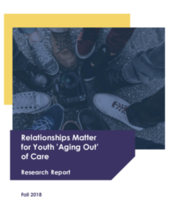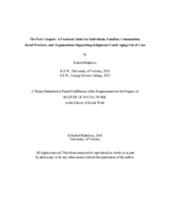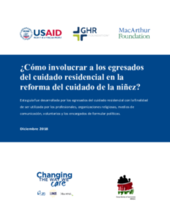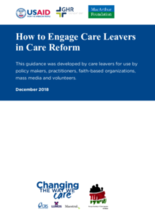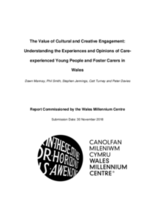Displaying 541 - 550 of 991
This qualitative case study explores the challenges facing children reunified with their families from an orphanage in Ghana.
Relationships Matter for Youth 'Aging Out' of Care is a collaborative photovoice project led by Melanie Doucet, who is a former youth in care, alongside eight former youth in care between the ages of 19 and 29 from the Greater Vancouver area.
This research utilized Indigenous methodologies rooted in oral traditions, storytelling practices, and the Medicine Wheel teachings to examine how individuals, families, communities, social workers, and organizations can assist Indigenous youth who are aging-out of foster care and are transitioning into adulthood.
In this study, the authors assessed differences in the risk of early motherhood among low-income, maltreated, and foster youth and investigated whether differences likely reflect selection factors versus effects of involvement with Child Protective Services (CPS) or foster care.
Using data from Ghana—a country that has initiated reintegration of children from residential care facilities, therefore providing a natural opportunity for comparative research—the authors of this study from the Children and Youth Services Review used hope, whether the child has been reunified with family/caregivers or remained in the care facility, and a statistical interaction of the two, along with controls, to predict the Child Status Index, an internationally-established measure of child wellbeing.
Esta guía promueve la participación de los egresados del cuidado residencial de una forma empoderada, siendo siempre sensible a sus historias y experiencias. Promueve la dignidad, respeta los derechos y crea un espacio para que sus voces aboguen por un cambio positivo.
This guidance was produced with the Kenya Society of Care Leavers to address how to best engage care leavers - who may have suffered personal trauma in their past and may not have an existing safety net to protect them, yet have a very important voice - in care reform.
This paper examines the efforts of a court to improve outcomes for older youth who are exiting foster care by implementing an Emancipation Checklist (EC) to guide discussion around 12 stability indicators thought to improve youth transition to adulthood (e.g., education, employment).
This research aimed to assess the current knowledge base regarding careexperienced children’s and young people’s engagement with the arts, and to explore the views of facilitators, young people, and their carers involved in the arts-based programme at the Wales Millennium Centre.
This study explores how foster care experiences can impact support network functionality as young people exit the foster care system.

